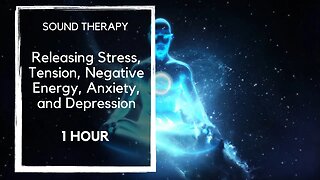Sound Therapy To Reduce Anxiety, Mental Health & Depression ( GUARANTEED )
Sound therapy is a holistic approach that harnesses the therapeutic power of sound to promote relaxation, alleviate anxiety, and support mental well-being. This form of therapy utilizes various sound techniques and frequencies to positively influence the mind and body, offering a non-invasive and accessible means of improving mental health. Here's a detailed description of how sound therapy can contribute to reducing anxiety, enhancing mental health, and alleviating depression:
1. Stress Reduction:
Sound therapy works by creating a serene auditory environment that helps individuals unwind and release tension. Calming sounds such as gentle waves, soft melodies, or nature sounds can trigger the relaxation response, reducing stress hormones and promoting a sense of tranquility.
2. Neural Regulation:
Certain frequencies and rhythms have the ability to regulate neural activity, influencing brainwave patterns associated with relaxation and emotional balance. Sound therapy encourages the brain to shift from high-stress beta waves to more calming alpha and theta waves, fostering a peaceful mental state.
3. Anxiety Alleviation:
Sound therapy offers a soothing escape from the demands of daily life, providing a mindful space for individuals to focus on the present moment. This can be particularly beneficial for those struggling with anxiety, as it helps redirect attention away from stressors and promotes a sense of grounding and calm.
4. Emotional Release:
The resonance of specific sounds can facilitate emotional release by tapping into and expressing suppressed feelings. This cathartic aspect of sound therapy allows individuals to process and release emotions, contributing to a healthier emotional balance and reduced vulnerability to anxiety and depression.
5. Mindfulness and Meditation:
Sound therapy is often integrated into mindfulness practices and meditation. The rhythmic and harmonious sounds serve as anchors for concentration, helping individuals achieve a state of deep relaxation and mental clarity. Regular mindfulness practices can enhance overall mental well-being and resilience.
6. Improved Sleep Quality:
Sound therapy can be an effective aid for individuals struggling with sleep disturbances associated with anxiety or depression. Relaxing sounds create a conducive environment for restful sleep, promoting better sleep quality and contributing to overall mental health.
7. Holistic Healing:
Sound therapy embraces a holistic approach, considering the interconnectedness of mind, body, and spirit. By addressing the emotional and mental aspects of well-being, it contributes to a more comprehensive and balanced approach to mental health.
8. Accessibility and Versatility:
One of the strengths of sound therapy is its accessibility. It can be easily incorporated into daily routines through practices like listening to calming music, engaging in guided sound meditations, or even using specialized sound healing tools such as singing bowls or tuning forks.
In conclusion, sound therapy provides a harmonious pathway towards reducing anxiety, supporting mental health, and alleviating depression. Its gentle yet profound impact on the mind and body makes it a valuable addition to a holistic approach to well-being.
-
 1:03:51
1:03:51
Relax Sleep Meditate Love
1 year ago1 Hour Sound Therapy for Releasing Stress, Tension, Negative Energy, Anxiety, and Depression
13 -
 59:59
59:59
EtherealFeelings - Healing Frequency Music
5 months agoLet Go of Fear, Worry and Anxiety 852 Hz | Healing Sounds For Anxiety & Sound Healing Benefits
140 -
 51:19
51:19
Sound Therapy Genius
3 months agoHealing Meditation Music | Release Stress & Anxiety | Sound Therapy | Inner Peace | Positive Energy
10 -
 44:29
44:29
Sound Therapy Genius
1 year agoSound Therapy for Relaxation | Release Stress & Anxiety | Beautiful Sunset Background | Sleep Music
5 -
 3:16:16
3:16:16
SoftSymphony
10 months agoRelaxing Music That Heals Stress, Anxiety and Depressive Conditions, Heals, Gentle Music #softmusic
3 -
 46:00
46:00
Sound Therapy Genius
3 months agoRelease Stress & Anxiety | Inner Balance | Sound Therapy | Soothing Music | Increase Positive Energy
16 -
 1:09:05
1:09:05
A Self-Care Watch For Your Body And Mind
11 months agoSound Wave Therapy for Emotional Health - Unlock Your Mind and Feel Better Now
155 -
 40:57
40:57
Sound Therapy Genius
1 year agoMeditative Sound Therapy for Stress Relief & Inner Peace, Positive Energy, Mindfulness Meditation
18 -
 2:04:14
2:04:14
BRNATURE
1 month agoGentle Rain and Serenity: Sound Therapy for Anxiety Reduction and Deep Relaxation
723 -
 3:33:30
3:33:30
SoftSymphony
10 months agoHealing Music to Relieve Stress, Fatigue and Depression, Release Negative Emotions
1